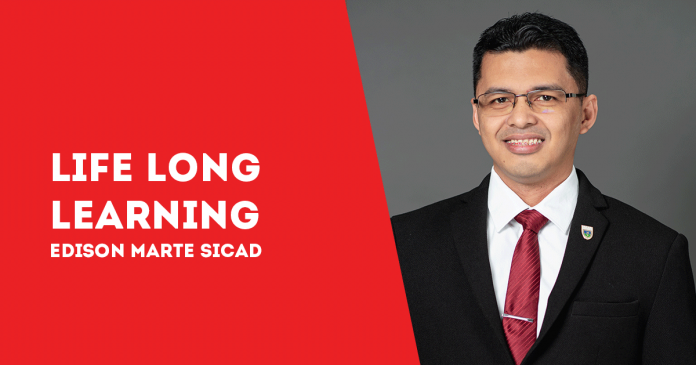
BY EDISON MARTE SICAD
“READING is a luxury; not everyone can afford it.”
Among other family practices or habits that parents must instill to the children, the value of reading books must be taken into consideration — even prioritized.
Although readers are sometimes considered as introverts and socially inept, the aim of this advocacy is for a person to be able to write and speak well, not only as a personal expression but also as a social skill.
A person who can effectively convey his message to the public, in written or spoken format, is a “dangerous” person. In a world of ideas, the advantage is to those who can articulate their conviction.
And in relation to education, the literacy of the students must not only be based in test results. They must also learn how to speak their mind, formulate their own philosophy in life, and defend their convictions: qualities that make a man manly.
And reading books can facilitate such articulation.
THE LITERACY PARADOX
Literacy must not be based on a standardized test. A uniform, multiple-choice, one correct answer, across the board testing—although it enhances concentration—dilutes the creative process of learning: a process that gives birth to new ideas.
Let’s get cynical about it: the testing industry is a business: create a demand by making it an institutional requirement, then make a profit out of the reviewees (the law of demand, then supply). Sadly, this is how the world works. Interestingly, the government supports it.
The blame-game about an international literacy assessment where the Philippines had a dismal ranking is amusing not only in the usual washing of hands but also in releasing Barabbas, so to speak (and they know what they are doing).
Supposedly, education paves the way for teachers to be professionals in preparing the youth for nation-building. But the misplaced adherence of the government in basing good literacy from such rankings and civic-mindedness from test scores created a practice of teachers distributing answer keys or students listening as the proctor recites the correct answer during the test: all in the name of performance bonus, er, I mean, performance standard.
WHAT IS WRONG WITH STANDARDIZED TESTING?
The “getting” of the correct answer becomes a dead-end. Knowledge is compartmentalized. And such testing creates a “scattered” appreciation of knowledge: a “Frankenstein” academic output. The rigor of holistic study is undervalued by “subjectifying” the lessons.
“I am not good in numbers.”
“I am only good in writing.”
“Memorization is boring/history.”
“I love P.E. (as long as it is just playing basketball)!”
Don’t get me wrong. There are still exemplary teachers and students out there who make the most of the learning opportunities.
I am just pointing out (and being biased about it) the interdisciplinary nature of knowledge and the value of spontaneity in creativity. For learning can also be organic, free-flowing, and nonlinear.
For knowledge is also “knowing”: a continuous process in mastering a skill in relation to personal development as an endeavor of craftmanship—your life as the masterpiece. The learning is not solely based in getting the correct answer (Hey, Siri); the learning happens when the learner is able to create something new out of the information he has gathered; he is able to make sense of the knowledge and create new connections based on his creative skill: the so-called higher order thinking skills.
Further, the difficulty in the learning process—where students struggle to understand and make a stand according to his thinking—is already learning. The “getting” of the correct or wrong answer is only a means to an end; ultimately, a confluence of the “is” and the “ought.”
And since it is a dialectic process, learning then is collaborative in the true sense of the word. For we can learn more from others and we can also contribute to the learning of others. Our participation is our contribution in the Great Conversation.
And this is where the Reading Books Advocacy matters more to me than any other teaching strategy or learning style. I advocate—dare challenge—the reading of books from cover to cover (textbooks are not included).
COVER TO COVER
I am referring here to books that somehow follow the tradition of the Western Canon. Books (or authors) that transcend mere knowing and challenge the reader to traverse confusions and arrive at an intellectual abode of higher order thinking skills; books that are difficult to read (Finnegans Wake!); books that get better upon reading them again (The Alchemist); authors that would change your perspective (Joe Dispenza); and authors that make you question the answers given by society (Neil Postman).
Reading is for the seeker, the thinker, the restless; it is the eternal (timeless) journey of never-arriving. For reading is always a stage of “becoming.” For a book does not end on the last page. The ending of a book is the beginning to a new life.
With this advocacy, I can dare say that, “we can read happily ever after.”/PN

